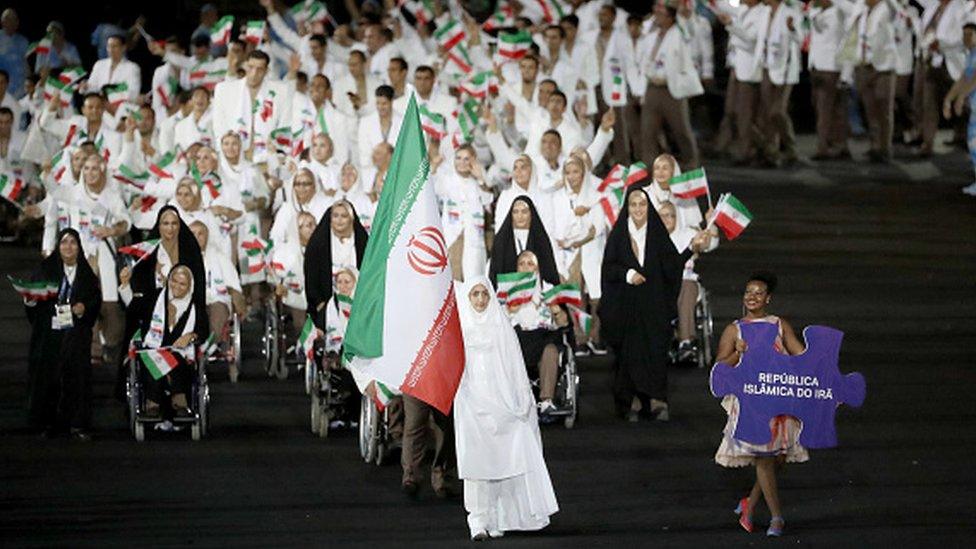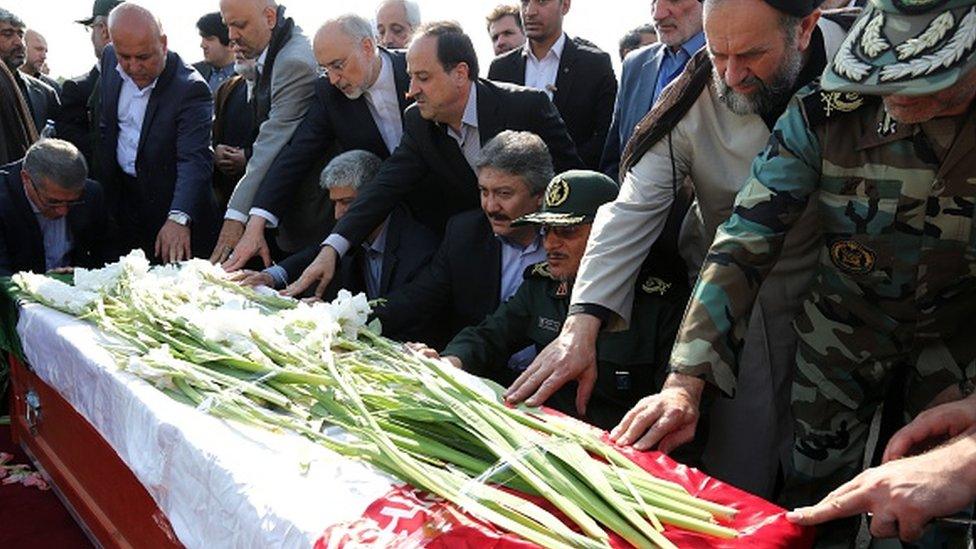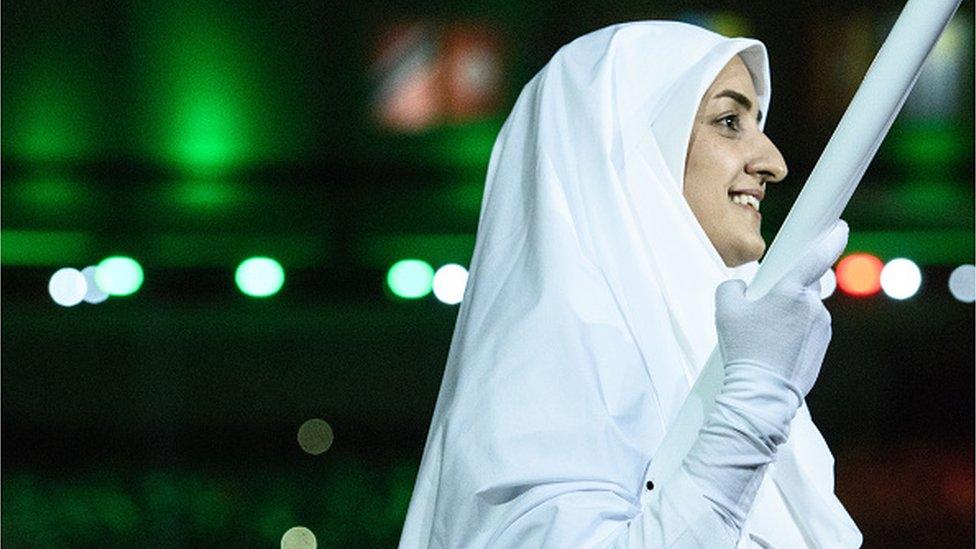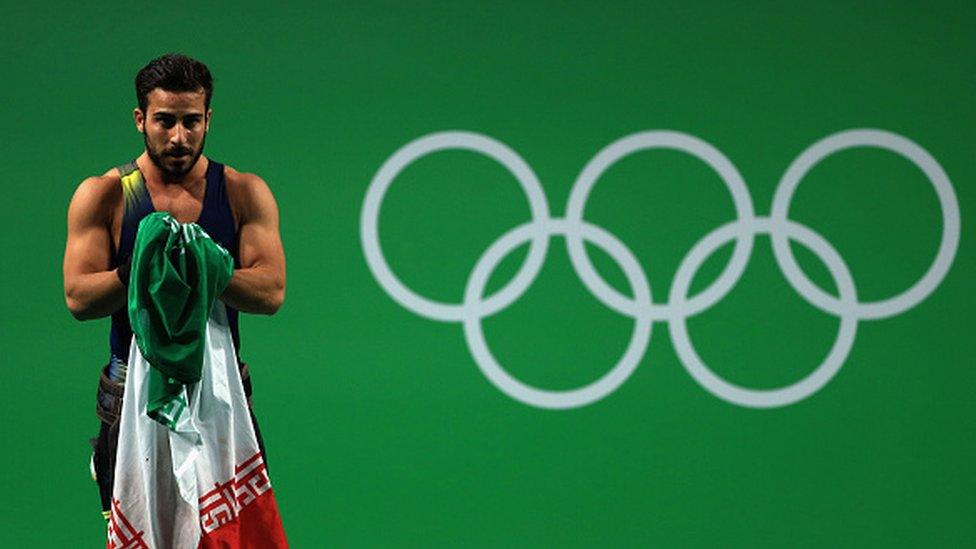Iran makes Paralympic protest over Hajj deaths
- Published

Iran named its Paralympic squad after the location of last year's fatal Hajj stampede
Although the eyes of the world were watching, it was a protest that seems to have gone largely unnoticed by much of the globe.
Most of the vast international TV audience for the Paralympic Games opening ceremony seem to have been unaware that Iran used the occasion to make a subtle symbolic dig at Saudi Arabia, over the deaths of hundreds of pilgrims during last year's Hajj.
Iran blames Saudi authorities for a fatal stampede at Mina, near the holy city of Mecca, on 24 September last year. Estimates of the death toll vary, with most agreeing that more than 2,000 pilgrims, external were killed - many of them Iranians, external - though official Saudi figures put the total at 769.
Tensions between the two countries have spiked again in recent days after Iran accused Saudi Arabia of blocking their nationals from attending the annual pilgrimage there this year, and Saudi Arabia's Grand Mufti, Abdul Aziz Al Sheikh, dismissed Iranians as "not Muslims". His remark came in response to a comment by Iran's supreme leader Ayatollah Ali Khamenei accusing Saudi Arabia of "murdering" the dead pilgrims, who were of various nationalities.
With the first anniversary of the tragedy approaching, Iran stepped things up by naming its Rio Paralympic team "Mina" in honour of the dead.

Iran regards those who died in the stampede as martyrs 'murdered' by the Saudi authorities
"We remember that last year during the same days, the tragedy of Mina took place during which many of our country's pilgrims together with other pilgrims from other countries were martyred. For this reason and in order to commemorate the hajj period and the martyred pilgrims, we have chosen the name [Mina] for the Iranian squad," the head of the Iranian National Paralympic Committee, Mahmoud Khosravi-Vafa said in an interview in Persian, external with the Iranian Mehr news agency.
The same sentiment was also carried forward into the choice of opening ceremony outfit worn by the most-visible member of the Iranian squad. While other women on the Iranian team wore gold-coloured hijabs, the Iranian flag-bearer wore an all-white costume, similar to an ihram, the item of clothing worn by many female Hajj pilgrims.

Iranian Paralympic flag-bearer Eshrat Kordestani's outfit evoked images of Hajj pilgrims
The Iran National Paralympic Committee opened its online report, external about the opening ceremony by noting: "Iran's squad took part in the parade while Eshrat Kordestani, who was the flag-bearer of the team, attended the ceremony in a white ihram. Iran's squad has taken part in the games with the name of 'Mina'".
The symbolism appears to have been lost on many spectators and the protest received no mention in English language reports by Iranian news agencies which have concentrated on less controversial Paralympic themes. Watching Wednesday night's spectacle, the Tasnim agency reported, external "one was reminded of the core concept of the ceremony: 'The heart knows no limits. Everybody has a heart.'"
The Iranian protest may have been largely intended for a largely domestic audience and seems have provoked little specific reaction from Saudi Arabia - though the general war of words over the stampede has continued unabated.
While many Iranians have applauded the Paralympic protest, others have been less impressed.
"Naming Iran's team in #Paralympics 'the Mina delegation' shows they are imposing politics on sports. The spirit of Olympics is much higher than such actions," one Iranian tweeted.
Others also thought the flag-bearer's costume was "surreal". One person tweeted: "The Mina delegation should have definitely gone to Mecca, not Rio."
However, many Iranians praised the Paralympic protest. "We should show the world that we have not forgotten those who got killed in Mina. Let us show the world that we are standing firmly against the brutal regime of Saudi," one person called Massoud commented, under a report, external on BBC Persian's Instagram account.
Another called Aptin thought there was ample precedent for mixing politics and sport: "Since the Saudi regime has brought all western media under influence by money, I believe this is a smart way to inform people of the world about what is going on in Saudi. Moreover, don't you remember after a black man was killed by American police, some members of a basketball team wore an 'I Can't Breathe' T-shirts, external during a game?"

Weightlifter Kainoush Rostami dedicated his Olympic victory to Iranians fighting in Syria
This is not the first time that Iranians have used Rio 2016 to make a point. During the Olympics two gold medallist weightlifters, Kianoush Rostami and Sohrab Moradi, dedicated their victories to "defenders of the holy shrines", the term used to describe Iranians fighting alongside the Assad regime in Syria.
Reporting by BBC Monitoring and BBC Persian
NEXT STORY: Single mum drags up for 'Donuts with Dad'

The mum who stuck on a moustache so her son wouldn't miss out on a school event. READ MORE
You can follow BBC Trending on Twitter @BBCtrending, external, and find us on Facebook, external. All our stories are at bbc.com/trending.